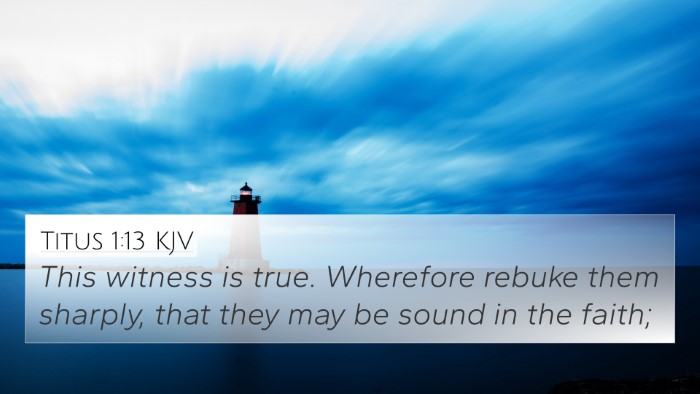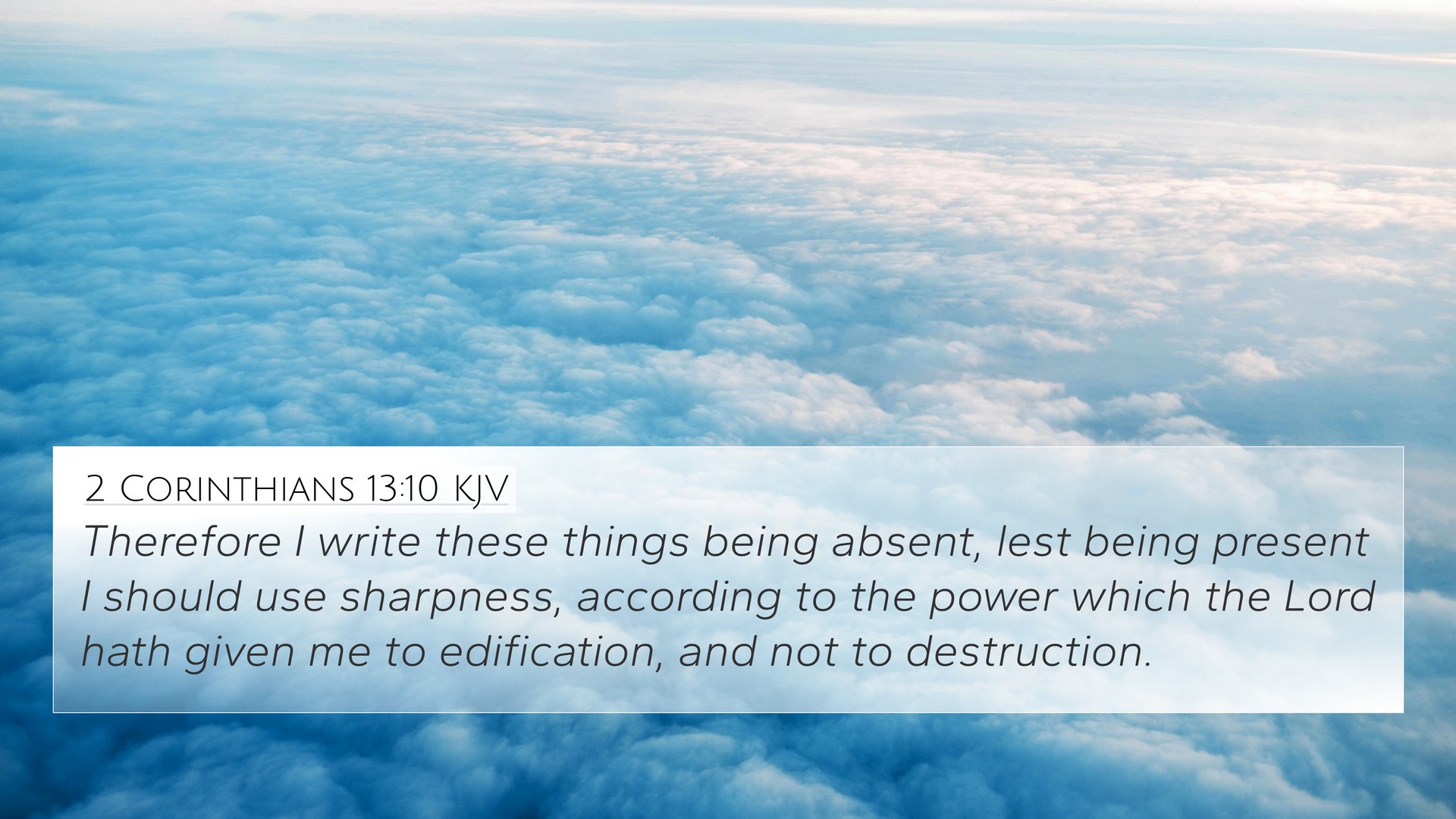Old Testament
Genesis Exodus Leviticus Numbers Deuteronomy Joshua Judges Ruth 1 Samuel 2 Samuel 1 Kings 2 Kings 1 Chronicles 2 Chronicles Ezra Nehemiah Esther Job Psalms Proverbs Ecclesiastes Song of Solomon Isaiah Jeremiah Lamentations Ezekiel Daniel Hosea Joel Amos Obadiah Jonah Micah Nahum Habakkuk Zephaniah Haggai Zechariah Malachi2 Corinthians 13:10 Similar Verses
2 Corinthians 13:10 Cross References
Therefore I write these things being absent, lest being present I should use sharpness, according to the power which the Lord hath given me to edification, and not to destruction.
Uncover the Rich Themes and Topics of This Bible Verse
Listed below are the Bible themes associated with 2 Corinthians 13:10. We invite you to explore each theme to gain deeper insights into the Scriptures.
2 Corinthians 13:10 Cross Reference Verses
This section features a detailed cross-reference designed to enrich your understanding of the Scriptures. Below, you will find carefully selected verses that echo the themes and teachings related to 2 Corinthians 13:10 KJV. Click on any image to explore detailed analyses of related Bible verses and uncover deeper theological insights.

2 Corinthians 10:8 (KJV) »
For though I should boast somewhat more of our authority, which the Lord hath given us for edification, and not for your destruction, I should not be ashamed:

2 Corinthians 2:3 (KJV) »
And I wrote this same unto you, lest, when I came, I should have sorrow from them of whom I ought to rejoice; having confidence in you all, that my joy is the joy of you all.

Titus 1:13 (KJV) »
This witness is true. Wherefore rebuke them sharply, that they may be sound in the faith;

1 Corinthians 4:21 (KJV) »
What will ye? shall I come unto you with a rod, or in love, and in the spirit of meekness?

2 Corinthians 10:2 (KJV) »
But I beseech you, that I may not be bold when I am present with that confidence, wherewith I think to be bold against some, which think of us as if we walked according to the flesh.

2 Corinthians 13:2 (KJV) »
I told you before, and foretell you, as if I were present, the second time; and being absent now I write to them which heretofore have sinned, and to all other, that, if I come again, I will not spare:

2 Corinthians 12:20 (KJV) »
For I fear, lest, when I come, I shall not find you such as I would, and that I shall be found unto you such as ye would not: lest there be debates, envyings, wraths, strifes, backbitings, whisperings, swellings, tumults:
2 Corinthians 13:10 Verse Analysis and Similar Verses
Understanding 2 Corinthians 13:10
Verse: “Therefore I write these things being absent, lest being present I should use sharpness, according to the power which the Lord hath given me to edification, and not to destruction.” (2 Corinthians 13:10)
Meaning and Interpretation
The Apostle Paul, in this concluding chapter of 2 Corinthians, emphasizes his authority in Christ and his intent to build up rather than tear down the church in Corinth. Here we find a delicate balance between correction and encouragement, which is the essence of good leadership.
Insights from Public Domain Commentaries
-
Matthew Henry:
Henry interprets this verse as illustrating Paul's commitment to constructive criticism. He points out that Paul desired not to be severe in his judgment when present, reflecting a pastoral heart focused on edification rather than condemnation. Henry emphasizes the importance of using spiritual authority for the growth of the believer.
-
Albert Barnes:
Barnes highlights that Paul's writing serves as a warning, signaling potential discipline if the church does not correct its ways. He underscores the idea that the power given to Paul is not for destruction but rather for the purpose of edifying the church, suggesting an intrinsic motivation to foster a healthy community of faith.
-
Adam Clarke:
Clarke provides insights into the context of Paul's authority. He underscores the contrast between Paul’s absence and presence, emphasizing that the sharpness he refers to in leadership arises from the need to confront sin. While authority can wield harshness, it is always aimed at nourishing the church’s spiritual vitality.
Key Themes
- Authority in Leadership: Paul illustrates the responsibilities that come with spiritual leadership, focusing on support and growth.
- Constructive Critique: The balance of correction and grace is central to Christian fellowship and community growth.
- Power for Edification: The power bestowed by God is intended for positive use, aiming to encourage and build believers.
Cross-References
To gain a fuller understanding of 2 Corinthians 13:10, here are related scriptures that enhance its meaning:
- 2 Timothy 4:2: “Preach the word; be instant in season, out of season; reprove, rebuke, exhort with all longsuffering and doctrine.”
- Ephesians 4:29: “Let no corrupt communication proceed out of your mouth, but that which is good to the use of edifying, that it may minister grace unto the hearers.”
- Galatians 6:1: “Brethren, if a man be overtaken in a fault, ye which are spiritual, restore such an one in the spirit of meekness; considering thyself, lest thou also be tempted.”
- 1 Corinthians 10:23: “All things are lawful for me, but all things are not expedient: all things are lawful for me, but all things edify not.”
- Hebrews 10:24: “And let us consider one another to provoke unto love and to good works.”
- Romans 14:19: “Let us therefore follow after the things which make for peace, and things wherewith one may edify another.”
- 1 Thessalonians 5:11: “Wherefore comfort yourselves together, and edify one another, even as also ye do.”
Conclusion
In summary, 2 Corinthians 13:10 serves as a powerful reminder of the balance required in leadership roles within the church. The intent behind Paul’s authority is vital to understand, as it fosters an environment of growth and spiritual health. By cross-referencing with related Scriptures, we can see a consistent biblical theme of building up one another in faith.



